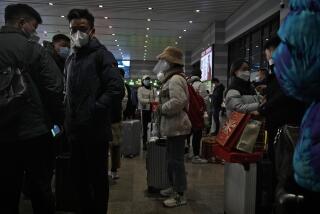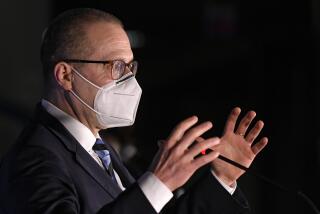Beijing Taken Off SARS Watch List
- Share via
BEIJING — The World Health Organization on Tuesday lifted its warning against travel to this capital city and removed it from the list of SARS-infected areas, one day after Hong Kong won the same distinction.
For global health authorities and Chinese officials, the back-to-back removal of the world’s two hardest-hit cities from the SARS watch list was a particularly sweet victory. Beijing had more SARS cases -- 2,521 infections and 191 deaths -- than any other city.
Tuesday’s announcement, which came seven months after severe acute respiratory syndrome surfaced in southern China, triggered small celebrations in the street and a surge in calls to five-star hotels that had seen their occupancy rates fall to as low as 3% during what normally is a peak travel time.
Beijing had stood alone -- the last city subject to a WHO travel advisory because of the deadly virus, which spread to more than two dozen countries, infecting 8,458 and killing 807. Only Toronto and Taiwan remain on WHO’s list of SARS- infected areas; travel advisories were lifted earlier.
“Today is a milestone in the fight against SARS, not only in China but in the world,” Shigeru Omi, the WHO regional director for the western Pacific, told the media here. He said the decision was based on a number of factors, including the drop in reported cases in Beijing and the quality of surveillance and control measures.
Omi said WHO had determined that the “chain of person-to-person, human-to-human transmission has been broken” in Beijing. There have been no new cases for 13 days and the city’s last SARS victim was placed in isolation May 29, according to the government.
Omi warned that the world should not let down its guard against the SARS threat, since much about the virus is still unknown and there is no vaccine or cure. Health officials also worry that the virus is seasonal and could resurface when the weather turns cold.
“There is no reason for complacency,” Omi said. “Surveillance should remain in place for at least one year.”
Still, the WHO announcement was cause for celebration, and Gao Qiang, China’s executive vice minister of health, declared Tuesday a “very good day for Beijing,” noting that “such a victory has not come easy.”
At the height of the SARS scare in early May, the normally congested streets here were empty and residents holed up inside their homes. In recent weeks, the city has begun to regain its bustle. One sign: Traffic is once again a headache.
Getting SARS under control was critical for China’s global credibility and its economic growth. In recent years, China has become one of the world’s leading traders and a major manufacturing platform for the world’s top companies.
Fred Hu, a Hong Kong-based managing director for Goldman Sachs Asia, estimates that SARS will shave at least half a percentage point off China’s growth rate this year, which is equivalent to $50 billion to $60 billion in lost income.
“This is significant,” he said. “Unless a very authoritative organization like the WHO did something like this, people would be quite reluctant to travel back to China.”
The crowded Beijing banquet room where smiling WHO and Chinese officials delivered the news was in stark contrast to the scene months earlier, when China faced global condemnation for covering up the outbreak.
Faced with pressure from abroad and mounting panic at home, China’s leaders replaced the mayor of Beijing as well as the nation’s health minister and imposed quarantine and surveillance measures.
Officials hope the country will soon be back on the travel map. Major tourist attractions such as the Great Wall and the Forbidden City had become ghost towns because of SARS. Beijing alone is expected to suffer $1.9 billion in losses in the tourism sector, according to the official New China News Agency. In the first five months of this year, tourist arrivals in the city fell by 9.2 million.
Analysts warned that the leisure tourism market could take months to recover. Business travel, however, is a different story.
Patrick Powers, China’s director for the U.S.-China Business Council, a Washington trade group, predicted a “swift return to business as usual.”
Cary Michael Gray, the general manager at the posh St. Regis Hotel, said he started seeing an uptick in reservations Monday from customers who were betting that Beijing was going to get a clean bill of health soon.
Dozens of major conferences and visits by heads of state and government are expected to be rescheduled later this year, according to Gray.
“This sends a message to the rest of the world, ‘Welcome back,’ ” said the hotel manager, who had T-shirts made up for 50 of his most loyal customers that bore the words “SARS Survivor Beijing 2003.”
Out on Beijing’s famous Silk Alley shopping street, where kiosk owners hawk knockoff Polo shirts and Hugo Boss jackets, Wang Hefang fanned herself as customers browsed through a collection of purses emblazoned with the Prada logo.
“Now that it [the travel advisory] has been lifted, people should start coming,” she said. “And with the people comes business. We depend on foreigners for our income. Chinese people don’t buy these purses.”
*
Times staff writer Henry Chu contributed to this report.
More to Read
Sign up for Essential California
The most important California stories and recommendations in your inbox every morning.
You may occasionally receive promotional content from the Los Angeles Times.













